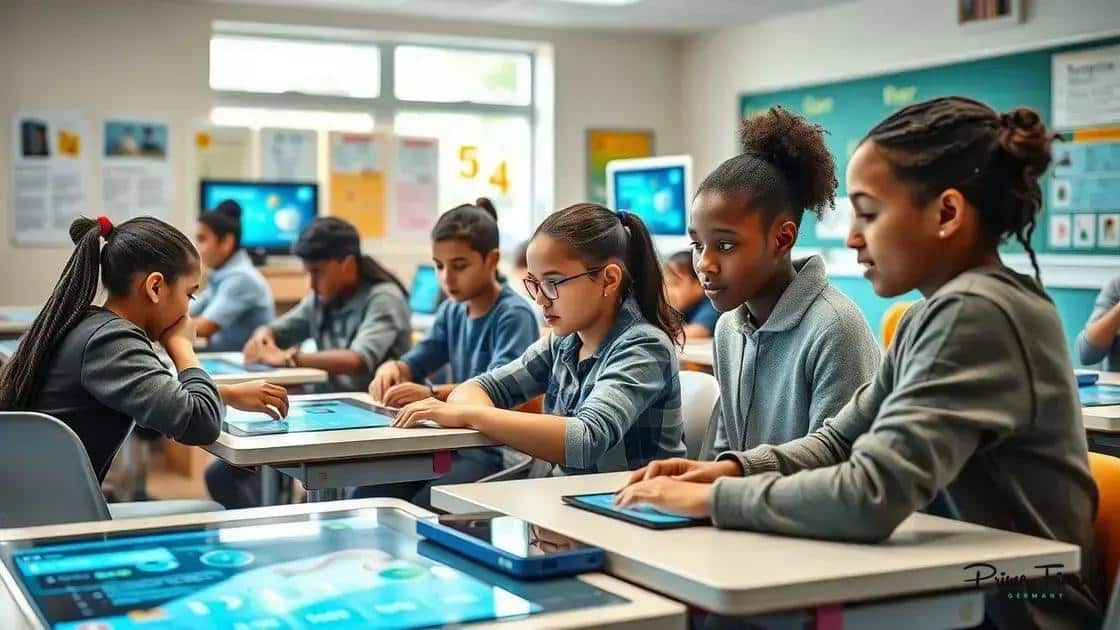AI advancements in personalized learning for education

AI advancements in personalized learning transform education by providing tailored learning experiences, enhancing student engagement, and offering adaptive resources that meet individual needs for improved academic outcomes.
AI advancements in personalized learning for education are reshaping the way students experience their learning journey. Imagine a classroom where lessons adapt to each student’s unique style and pace. Sounds intriguing, right?
Understanding personalized learning through AI
Understanding personalized learning through AI is essential for modern education. With technology changing rapidly, students benefit from unique learning paths that cater to their individual needs. This approach focuses on how students learn best and adapts the curriculum accordingly.
The Role of AI in Personalization
Artificial Intelligence plays a crucial role in creating personalized learning experiences. By analyzing data on student performance, AI can identify strengths and weaknesses. This information helps educators tailor instructions and resources for each learner.
Benefits of AI-Driven Personalized Learning
- Increased engagement by adapting learning materials to various learning styles.
- Improved achievement through customized assessment and feedback.
- Enhanced motivation as students progress at their own pace.
Moreover, AI can provide real-time insights into student progress. Teachers gain valuable time to focus on teaching while AI handles data analysis. This partnership between AI and educators fosters a more supportive learning environment.
Personalized learning helps students feel more connected and invested in their education. With resources tailored to their interests, learners are likely to stay engaged and excel in their studies. AI technologies, such as intelligent tutoring systems and adaptive learning platforms, contribute significantly to this innovative approach.
Finally, implementing AI in educational settings allows for scalable personalized learning solutions. Schools can enhance their curriculums without overwhelming educators. As technology continues to evolve, the integration of AI in personalized learning will bring forth new opportunities for student success.
How AI tailors education for diverse learners

How AI tailors education for diverse learners is a fascinating aspect of modern teaching. With advancements in technology, educators can now cater to the unique needs of every student. By using data analytics, AI identifies individual strengths, preferences, and areas for improvement.
Adaptive Learning Systems
Adaptive learning systems are a key feature of AI in education. These systems adjust content and assessments based on student performance. As learners engage with materials, the AI continuously adapts, providing a customized learning experience that suits various learning styles.
Benefits for Diverse Learners
- Provides resources tailored to different skill levels.
- Enhances motivation through personalized feedback.
- Supports students with special needs by offering customized tools and strategies.
Additionally, AI helps educators create learning environments that recognize and celebrate diversity. By understanding each student’s background and learning preferences, teachers can build a more inclusive classroom. This approach fosters a sense of belonging among students, encouraging them to participate actively in their learning process.
Moreover, AI-driven tools can assist teachers in identifying when a student may need additional support. By analyzing engagement and performance metrics, these tools can signal when to intervene, making the learning process more effective. The goal is to ensure that every student reaches their full potential.
Ultimately, the ability of AI to intelligently personalize education makes it a vital resource in today’s classrooms. As technology continues to grow, so do the opportunities for helping each student thrive in their educational journey.
The impact of AI on student engagement
The impact of AI on student engagement is significant and transformative. With artificial intelligence integrated into educational tools, learning becomes more interactive and enjoyable. Students are more likely to participate when the material resonates with their interests and learning styles.
Interactive Learning Experiences
AI technologies, such as gamified learning platforms, create interactive environments that capture students’ attention. These platforms use game-like elements to motivate learners, allowing them to progress through challenges at their own pace. As students encounter new concepts in a fun format, their engagement levels rise.
Personalized Feedback
- Students receive instant feedback on their performance.
- AI identifies areas for improvement and celebrates achievements.
- Personalized recommendations keep learners on track.
This approach encourages students to reflect on their learning and stay motivated. With immediate responses, students feel more connected to their progress. AI tools help tailor the educational experience so that each learner can achieve their goals.
Moreover, AI-driven analytics provide teachers with insights into student behavior and engagement patterns. Educators can track participation levels and understand what strategies work best for specific groups. This data allows for adjustments in teaching methods, making learning more relevant and engaging for students.
Ultimately, AI plays a pivotal role in enhancing student engagement by creating a more personalized and interactive learning experience. As technology advances, we can expect even greater integration of AI tools in educational settings, leading to improved engagement and success rates for all students.
Challenges of integrating AI in education

Integrating AI in education comes with various challenges that educators and institutions must address. While the benefits of personalized learning are clear, the path to successful implementation can be complex. Understanding these obstacles is essential for fostering a smooth transition to AI-driven education.
Technological Barriers
First, many schools face technological barriers when adopting AI tools. Not all classrooms have the necessary infrastructure, such as reliable internet and modern devices. Additionally, training teachers to use these tools effectively can be resource-intensive.
Data Privacy Concerns
- Students’ personal information must be protected.
- Schools need to comply with regulations regarding data security.
- Transparency is essential in how data is collected and used.
Moreover, concerns about data privacy can hinder the adoption of AI in classrooms. Schools must prioritize student safety and understand the legal implications of using AI systems that require personal data. Building trust with parents and communities about data handling is vital.
Another challenge lies in ensuring that all students benefit equally from AI technologies. There is a risk that some learners, particularly those from disadvantaged backgrounds, might not have the same access to AI-driven resources. Thus, bridging the digital divide is crucial to ensure equitable educational opportunities.
Furthermore, educators might encounter resistance to change. Some teachers may feel overwhelmed by new technologies and might prefer traditional teaching methods. It’s essential to provide adequate support and professional development to ease this transition and demonstrate the advantages of integrated AI.
Addressing these challenges head-on requires collaboration among educators, technology providers, and policymakers. By working together, they can develop strategies that promote effective integration of AI in education, ensuring that all students can reap the benefits.
Future trends in AI for personalized education
Future trends in AI for personalized education are shaping the way students learn and grow. As technology evolves, we can expect more innovative solutions that enhance individual learning experiences. These advancements will help create classrooms that adapt to the needs of every student.
Enhanced Machine Learning Algorithms
One major trend is the development of enhanced machine learning algorithms. These algorithms can better analyze student data and predict learning outcomes. As algorithms improve, they will offer increasingly precise recommendations tailored to each learner’s unique path.
AI-Driven Content Creation
Additionally, AI-driven content creation tools are emerging. They will allow educators to generate educational materials that cater specifically to the strengths and interests of their students. This will make learning more relevant and engaging, as resources will align closely with what students are passionate about.
Another exciting trend is the use of AI in assessments. Future AI systems will provide more comprehensive evaluations that go beyond traditional testing methods. They will track not only academic performance but also social and emotional growth, offering a holistic view of student development.
Moreover, as learning environments become more flexible, AI can support personalized learning plans that adapt to changing circumstances. Remote learning platforms will utilize AI to enhance interaction, making virtual classrooms as engaging as in-person sessions. This adaptability will ensure that learning continues effectively, regardless of the setting.
As we move forward, the collaboration between educators and AI technology will deepen. Teachers will play a crucial role in interpreting AI-generated insights and integrating them into their teaching strategies. This partnership will redefine education, creating an environment where every student can thrive.
As we look ahead, the future of AI in personalized education is bright and full of potential. The ongoing advancements will continue to shape how students learn, making education more tailored and engaging. With innovative technologies and effective collaboration between educators and AI, we can create an inclusive learning environment that meets the needs of every student. By overcoming the challenges of integration, we can ensure that all learners benefit from these exciting developments. The journey ahead promises not only to enhance academic success but also to foster a love for lifelong learning in students everywhere.
FAQ – Frequently Asked Questions about AI in Personalized Education
How does AI enhance personalized learning experiences?
AI provides tailored educational resources and adaptive learning paths based on individual student data, improving engagement and success.
What are some challenges of integrating AI in classrooms?
Challenges include technological barriers, data privacy concerns, and ensuring equitable access for all students.
What role do teachers play in an AI-enhanced learning environment?
Teachers help interpret AI insights, personalize instruction, and facilitate collaboration between students and technology.
What future trends can we expect in AI education?
Expect advancements in machine learning algorithms, AI-driven content creation, and more holistic assessment methods that focus on overall student development.





